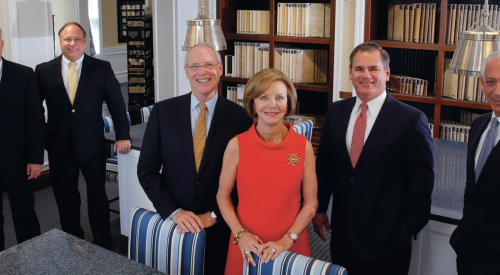| Fidelity Home’s founders Todd Menke and David Hunihan are building a business based in TQM principles.
|
When Professional Builder presents the National Housing Quality Awards each fall at our Benchmark Management Conference, we intend it to be an inspiring event for attendees. In the case of Florida home building executives David Hunihan, 34, and Todd Menke, 33, it was more than that. It was life changing.
In fact, just eight months after attending the 1999 Benchmark Conference, Hunihan and Menke resigned executive positions at one of Florida’s top home building firms to launch a new company, Fidelity Homes. Their new company is based on Benchmark’s lessons about the potential of Total Quality Management to positively impact every aspect of home builder operations.
Their business plan for the new, North Port, Fla.-based company states:
"To succeed as a home building enterprise in the new millennium, we must construct a total quality management and delivery system that focuses on empowerment and personal responsibility to ignite the production machine..."
What makes all this especially intriguing is how closely the creation of Fidelity Homes parallels our 2000 series - Think Fast! - in which we interviewed experienced builders and top management consultants to compile a list of dos and don’ts for a hypothetical new millennium startup company.
And so, we made an offer to Hunihan and Menke that the fledgling builders could not resist. We provide them with access to the many top housing industry consultants who write for this magazine, and in return they allow us open access to follow their company during its first full year of Fidelity Homes operations.
Beginning here and now, you will see Fidelity spring to life, and follow Hunihan and Menke as they attempt to buck the odds stacked against a startup company. Over the course of the next year, you’ll be able to watch them succeed or fail as they try to grow Fidelity into a force in the Sarasota County housing market.
David and Todd have a proven track record as exceptional managers. Advice from our cadre of contributing editors ought to help. And TQM has certainly proved to be a force for positive change in the housing industry. The Fidelity startup is an opportunity to see what inspired young leaders can do with TQM starting from ground zero. But we all know that home building is a high risk, high reward business - and there are no guarantees for anyone. Still, we’ve seen quality-process control work as a management methodology for companies as diverse as Shea Homes in California, Oakwood Homes in Colorado, and David Weekley Homes in four different states. Will it have the power to tip the odds toward success for a startup with very limited resources?
We think our readers will find this series on Fidelity Homes fascinating and educational. After all, this may be the first home building company ever founded - from the ground up - on principles like empowerment of employees and totally equal partnering relationships with trade contractors and vendors. Even the many winners of the National Housing Quality Award have all had to go through some measure of corporate culture overhaul to reach NHQ levels of performance. In Fidelity Homes, we see a startup firm with three employees declaring, before it has ever built a house, that one of its goals is to win the NHQ Gold Award.
Where Fidelity Begins
| The Fidelity Homes team includes Hunihan, Heather Foerster administrative assistant, Jay Maynell construction manager, Chuck Castellana salesperson and Menke.
|
"We went to Benchmark 1999 at Turnberry Isle, and Todd and I were reborn," says Hunihan. "We met so many great people, from companies that are absolutely legendary in this industry, and they were all willing to freely share their experiences. I grew up in New Jersey, and my mailing address was Red Bank, so to meet Mark Hodges and hear from him all the initiatives K. Hovnanian Companies has underway was a big thrill.
"Then Diane Rivera (director of quality) of Shea Homes invited us to come to San Diego for a four-day program she was putting on. When we came back from Benchmark, we felt we owed it to our customers, employees, and trade contractors to install TQM. We’d found a better way to run a company. And it’s not just better. It’s a lot more fun."
The pair report trying for eight months to move toward TQM in the company where they worked as senior executives. But there was a fundamental obstacle to their ability to pull it off. "We weren’t owners," says Menke. "One of the lessons we learned from all those NHQ winners was the importance of leadership from the very top of the organization to get TQM rolling in a company. We worked for the best home builder on the west coast of Florida, but like so many successful people, he didn’t see a need to radically change the management style that has worked so well for him. We understood that reluctance, but we felt we had to try it."
"It was painful to have to leave, but I decided I had to go," says Hunihan, "and Todd said if I was going, he was coming with me."
"We’re best friends," says Menke, "so we decided we could do it better together. We’d both always envisioned having our own business. One of the things we worried about was that many builders told us how they had to sacrifice a normal family life to start a company. We don’t want that. Our hope is that, since we are so much alike, we can cover for each other. We may make only half as much money, but we hope to each be able to spend more time at home."
What they might have added is the possibility that a new TQM-based organization where employees are carefully recruited, well trained, and then fully empowered may not require as much hands-on control by the owners - even in the first year. We shall see...
Smart Guys
Hunihan and Menke have a strong blend of complementary skills. But perhaps the most important talent for a startup builder is one they share - both are exceptional new home salesmen. In fact, it was hiring Menke into a sales position that allowed Hunihan to launch himself (and later Menke) onto a shooting star career path, as the pair helped propel their previous employer from $8.5 million in annual sales to over $40 million in less than five years. At the end of that growth cycle, Hunihan was president of the firm and Menke executive vice president.
A 1989 graduate of Boston College, with a degree in marketing, Hunihan left his home turf in New Jersey when his parents bought a vacation home in Venice, Fla., in 1991. "My father was getting close to retirement. The people he bought a villa from had a real estate business in Venice. They were looking for a partner and approached me. At the time, I was selling jewelry in Manhattan. I liked the idea of getting out of the one-hour, 45 minute, one-way commute I was making into the city every morning."
Within a couple of years, Hunihan was a top-selling agent at Venice Golf & Country Club and teaching real estate sales courses at Sarasota County Technical Institute. "That was a great experience for me," he says now. "I learned how to be a teacher and a leader."
During this mid-’90s era, he also met his wife, Lauren, at a wedding in Princeton, N.J. They were married in June, 1994. They now have two daughters - Shannon, 4, and Samantha, 2.
When he moved into new home sales with one of Sarasota’s top semi-custom builders, Hunihan was not an immediate success. In fact, he did not have a sale for three months. "My boss stopped by the model one Sunday afternoon, dressed in shorts and a tee-shirt," Hunihan recalls. "We sat by the pool, and he told me I knew how to sell, to quit worrying about it, relax, and just do it. After that, everything kicked in and sales started to happen. It was a powerful lesson for me in sales management. I was trying too hard. As a manager, I now realize how important it is to keep sales people relaxed and upbeat. Tension is certainly the enemy of that."
Todd Menke grew up in Atlanta, where his father’s financial services business catered to luminary clients like home run king Hank Aaron. Frank Menke started developing shopping centers in Bradenton, Fla., in 1984, and moved the family there when Todd had but a year remaining in high school. But he took to Florida in a big way. A 1990 graduate of the University of Florida with a degree in economics, Menke started his business career in commercial banking with Citizens & Southern Bank.
"Commercial banking just didn’t feel right to me," he says now. "So I got a job selling securities, and knocked on every door in Gulf Gate (a Sarasota neighborhood). I didn’t last long. My father took pity on me, and I went to work for him in commercial development. I got my real estate license in 1992. I met David at a party in 1993 while I was on my first date with my wife Kellie. We all hit it off immediately."
"He drank most of the beer I brought to the party," says Hunihan. "Our wives became fast friends. Lauren and I have become honorary Gators by circulating with Kellie and Todd."
The Menkes were married in 1995. Lauren Hunihan sang at the wedding. The couples even belong to the same Episcopal church. "Todd and I are not only best friends, we are morally and ethically aligned," says Hunihan.
Hunihan hired Menke in January, 1997. "I hire for talent, integrity, and character. Todd had it all. Moreover, he was interested in getting out of his dad’s company and into residential sales. The fact that he was a friend didn’t slow me down at all. I knew he’d be a star. If Todd was going into residential, I wanted him working with us, not one of the other builders in town."
Menke sold a house on the first day and quickly broke the sales records Hunihan set. "I learned how to sell houses from David," says Menke. "He followed me around with a tape recorder for the first week," Hunihan says with a laugh. "He taped everything I said to customers. But he’s the quickest learn I’ve ever seen. He became our top sales producer. Our builder had the best floor plans and delivered the best value in the market. Those were some fun days. Todd is a great listener. He finds out what the customer wants, and that’s the key to selling."
When they worried that both lacked experience as field construction managers, Menke and Hunihan took the course to become licensed Florida residential contractors together. Both passed the exam on the first try, with flying colors. "That was an amazing experience, studying for that exam with David," says Menke. "Our experience is in financial management, sales and marketing, operations systems. Neither of us grew up in the business as a construction superintendent, so we were out of our comfort zone. Now we both feel very confident on the job site."
They sold houses so fast that the company nearly ran out of lots. "We were doing over 120 houses a year, and actually had only 131 lots out in front of us," Hunihan remembers. "Todd’s background in commercial real estate and financial management made him the perfect person to solve that problem. We promoted him to vice president of project development, and within six months, we had over 700 lots in front of us. And that was all on very favorable terms, with prices locked in for several years, very little money down, and competitive control of the locations."
Seeds Of Independence
In the fall of 1998, Benchmark made its first impact on their consciousness. "We didn’t even go," says Hunihan. "It was in Palm Springs. Todd and I were really busy and we saw it as a conference mostly about production issues. Our owner went, and took the senior vp of construction with him. When they came back, it was like our construction vp had been to a cult meeting. He had a spark that invigorated the whole company. He said that he was so committed to TQM and the concept of partnering with trades that he was going to implement it even if it cost him his job.
"We thought, ‘Wow. We’ve got to check this out.’ So in 1999, with the conference in South Florida, we both went and the rest is pretty much history."
Fidelity Blooms
"One of the principles of TQM that we learned about at Benchmark is alignment - the concept of creating a people-centered organization where the mission statement is more than a cute phrase that only senior management knows," says Menke. "It’s the idea that right down through the whole organization, everyone understands the core values, the mission, and how each person contributes to reaching goals.
"David and I are so closely aligned it’s frightening. Sometimes I tell him what he’s thinking, and he’s always finishing sentences for me. Our wives think we’re actually twins, separated at birth. When we made the decision to launch Fidelity, we said, ‘What if we get a whole team aligned the way we are? We’ve been talking the talk. It’s time to walk the walk.’"
They started in June of last year, with Menke writing a business plan and Hunihan a marketing plan. Then they merged the two documents. It reads as a compilation of TQM best practices from many companies around the country. As a unified whole, it makes Fidelity probably the most TQM-grounded home building startup in industry history.
They chose "Fidelity" for their corporate name to pick up the Webster’s definition of the word - "the state or quality of being faithful." A tag line for the company logo was immediately added - "Where Quality and Service Come Home." The corporate vision statement reads - "We want to create a world class organization that dominates the market through superior quality results, total customer care and the relentless desire to constantly improve the home building process."
Corporate values are defined as "people, integrity, fairness, teamwork, education, excellence and continuous improvement." The mission statement reads - "We are in the business of building homes of enduring value in profitable cooperation with our customers, trade partners and associates."
Among other nuggets of wisdom:
"It’s funny," says Hunihan. "When I told my father about TQM coming into the housing industry, he got excited and hauled out all his old materials from the early 1980s, when he took his electrical manufacturing company through it. He gave me a book about W. Edwards Deming."
Fast Start
When the pair started their business, they capitalized it with investment funds gathered from family, friends and neighbors in addition to their own savings. "We had enough savings to live on for a while," says Hunihan. "And we had severance agreements that brought in some payments for a time. Todd and I put in seed money of $10,000 apiece. Our first investor put in $200,000 to capitalize the company. We signed and notarized a note to pay the money back, over time, at very favorable rates."
From this modest beginning, Fidelity Homes garnered an incredibly fast start in terms of market presence. Hunihan’s and Menke’s visibility in the local industry as senior executives of a high-profile company unquestionably greased the tracks. Hunihan is an officer and director of the sales and marketing council of the Sarasota County HBA. Menke spent the previous year ranging far and wide, looking for land deals, and had 18 on the docket that their previous company had passed on.
"Nothing we’re doing now or in the future involves anything that we worked on for our previous employer," says Hunihan. "We don’t want to compete with him. He’s too good at what he does. And we want everyone to know that we never used our positions with that company to advance our careers after we left. We are deliberately going into product types, pricing and location niches where he would never go."
At the same time they were searching for projects (and investors to finance those projects), both partners were also meeting with bankers, attorneys, trade partners, suppliers, and vendors needed to produce quality housing products. "We hand-picked the core constituents of our production umbrella," says Menke. "We showed each of them our business plan and said, ‘This is why you should bet on us.’ We asked every one of them to become a strategic alliance partner, and cut us a deal on their services up front, in return for the opportunity to become our preferred vendor down the road.
"We could not afford to write checks and put them all on retainer, but we found enough people who believe in our future that we now have strong relationships in all the key areas that surround the home building business."
For example, Chris Spiro of Spiro & Waites Marketing in Ft. Myers (Fla.) designed logos, collateral materials, ads and brochures. "All of it basically without up front payment," says Hunihan. "Chris said, ‘I know you’ll be successful. Pay me when you can.’
"Michelle Lamont did our Web site in the same way (www.fidelityhomes.net), which gives us a terrific market presence without a big investment. We’ve had many, many professionals provide services to us with the payments back-loaded until after we start to generate cash flow."
Bobcat Trail
On their first development, Hunihan and Menke hit what amounts to a home run by a rookie in his first major league at-bat.
North Port is a small community on the southern edge of Sarasota County. It is widely regarded as an emerging high-growth housing market. The city is aggressively seeking growth, a contrast to the rest of Sarasota County, and Manatee County to the north, where high growth is now occurring but the political climate is swinging toward opposition to growth.
Bobcat Trail is a country club community, just two miles from I-75 in North Port, aimed at pre-retirement and retired snowbirds. The golf course is open and the community is experiencing strong traffic and sales. The strongest sales were in an attached "villa" product, which was selling at a pace of 3.6 units per month over 13 months ending last spring. That’s when construction stopped on Phases I and II of Bobcat Villas. The builder’s funding was halted by Peninsula Bank due to cross-collateralization with a failed apartment project nearby.
Of the 74 units (fourplex, single-story buildings) in Phases I and II, 23 were unsold and 18 were incomplete and required further construction. When it was discovered how many trade contractors remained unpaid, with liens pending, it became clear to local builders that the project would require a workout.
Meanwhile, the undeveloped site for 36 units in Phase III remained in the hands of the Bobcat Trail developer, KEB Bobcat Inc. It was widely perceived by local builders that doing a workout on Phases I and II would not be particularly attractive, but might be worth the aggravation to get a shot at what looked to be a gold mine in Phase III. Many builders looked into a possible workout, but the bank refused to write down the loan on Phases I and II.
Enter Hunihan and Menke. "We saw this as a unique selling situation that could really give us a head start toward success," says Hunihan. "It had existing inventory that would allow us to exercise our sales and managerial ability in completing Phases I and II. And that would set up Phase III as a perfect opportunity to have the first project we do from scratch be an instant hot-selling success, since we would actually just be completing a project that was already a proven winner."
The challenge was how to get the bank to work with Fidelity, so it could get its hands on Phase III. "We decided to do an end run," says Menke. "We went to KEB and bought Phase III. We got the undeveloped site for 36 villas for $576,000 by making a nonrefundable deposit of $10,000 at contract signing on June 30, 2000."
An additional $40,000 was due on July 7, with the deposit balance of $175,000 due on August 10, 2000. That time frame gave the partners the necessary days to line up investors to fund the project, and they pulled that off.
In the meantime, the bank was dumbfounded. "When we bought Phase III, it eliminated all the other builders in town as contenders for a workout on Phases I and II," says Menke. "We knew the bank would eventually have to come to us, since we now held the pot at the end of the rainbow."
The bank came back to the table, but still would not write down the loan. "Eventually, we came up with a proposal to complete sales and construction of Phases I and II of the Bobcat Villas for a combination of sales commissions and construction management fees," says Hunihan. "The bank owns the villas and pays for construction. We get paid bonuses for selling above the budgeted sales prices, and for savings achieved by bringing in construction under budget."
No Overhead Operations
This very smart deal becomes a grand slam when you consider that the now renamed "Golf Villas at Bobcat Trail" come with another nifty little bonus - free office space. "We’re selling a gated golf community with prices starting at about $150,000, and that includes a golf membership at an annual fee of $1500 for an individual, $2000 for a family," says Hunihan. "A very attractive product. We bought the site on a deferred take-down basis, with very little money down. And because the developer has control of the home owners association, the clubhouse and pool are now available for us to use as a sales office rent free, and with no charge for utilities."
The existing home owners don’t mind because Hunihan and Menke brought in a property manager, put in new landscaping, and picked up the pace of marketing - so the clubhouse will belong to the residents sooner rather than later.
"We’re building goodwill with the residents," says Menke. "We throw parties for them on the weekends, and they bring us their friends from up north as sales prospects. In the meantime, we have office space with no overhead."
In The Pipeline
The two partners continue to attract investors by offering very attractive returns. "For Phase III at Bobcat Trail, we had to come up with $225,000 in equity. Our first investor put in $100,000. He’ll get $35,000 a year for two years on that investment," says Menke. "He’ll be paid in several different ways, partly as interest on a loan and partly in profit sharing at the end.
"We’re paying some pretty hefty returns, but we look at it this way: they’re getting us into business. We have ten to 20 years to get rich. Right now, we’re just trying to get a toehold."
By using the same approach, Hunihan and Menke already have two more locations with huge potential under contract. One will put them into the business of building single-family homes for families, with prices running between $150,000 and $200,000. That site is located in close proximity to a new high school, middle school, and elementary school in North Port. (Sarasota County has the highest rated schools in Florida.) Another site has the two partners building $600,000 spec homes in an established urban neighborhood close to downtown Sarasota, where property values are appreciating at rates above 15% a year.
"We have no houses of our own under construction now," Hunihan said in mid-February. "Within the next couple of weeks, we’ll be working on 15 under construction."
More on these developments next month...
Also See:












